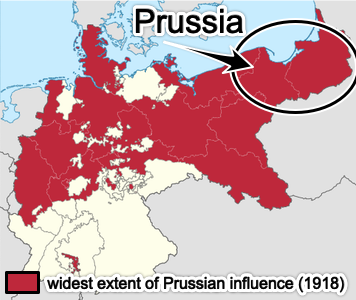Prussian Ancestry Research
In the summer of 1871, my great-great-grandfather Friedrich Otto Deutschendorf, his wife Florentine Friederike Caroline (née Czarnetzki), and their three young children – including my great-grandfather Karl Friedrich Otto Deutschendorf who was barely a year old – left their home town of Rosenberg in the German province of West Prussia, and traveled (somehow) to the port of Hamburg where they began the perilous six-week journey across the Atlantic on two separate sailboats to America, finally arriving at the Port of New York in September 1871.

This site is dedicated to researching them and their ancestors.
Those ancestors lived in a region which, although it lies in modern-day Poland and Russia, at that time represented the eastern periphery of the newly-formed German Reich called Prussia. They lived in a province called West Prussia, to be exact. However, that entire region is often referred to as East Prussia to distinguish it from the western regions of the German Reich that were increasingly brought under Prussian influence. So my ancestors can be said to be from both West and East Prussia. Confused yet? I've provided an overview if you're interested.
To the right (or below if you're viewing this on a phone), you'll find my great-granddad Karl's »Ahnentafel«… a commonly-used genealogical device which happens to have a German name (it means "Ancestor Table"). To quote my Aunt Shirley who is an experienced and published genealogical researcher and who also introduced me to this type of table:
This chart gives data only on your direct ancestors and is used when space is limited. In this system, the person for whom the study is being made is listed as number 1. That person's father is number 2 and the mother is number 3. From that point on, all men are given even numbers and their wives will have odd numbers. Each individual's number is simply doubled to find their parents. Family names are capitalized. There will be gaps occasionally when names are not known. When a number is skipped, it means that those individuals have not yet been identified.
So the short table to the right represents all of my known direct ancestors in Prussia. Below is a graphical tree representation of the same data.
My great grandfather's »Ahnentafel«
Open Source
This site also represents my attempt to clone some of the functionality found on Ancestry.com with additional features I've often felt were missing. Click on any individual's name in the Ahnentafel, and you'll be taken to their detail page where you can view their timeline, their close family relations, as well as images and translations of historical records in which they are referenced.
The source code for this site is available (minus all of my family information, of course) as an open source project on Github for anyone interested in hosting their own Ancestry clone. The site is built with Python, Django and SQLite.
Deutschendorf Origin Story
Deutschendorf is a family name with deep Prussian roots.
How do I know that? Well, if you search for references to the name "Deutschendorf" before the year 1850 on Ancestry.com – which has an excellent searchable database of old German church records – you won't find any references to Deutschendorfs living "Im Reich" (that is, in the German Reich to the west), but you will find dozens of references to Deutschendorfs living to the east in Prussia.
Stiglowait
While I was researching my Mother's German ancestors from Alsace, I would occasionally encounter a family name that I was personally unfamiliar with. But a quick Google search would always return several relevant search results with pointers to many historical examples and explanations of each unfamiliar name.
While researching my Father's German ancestors from West Prussia however, I believe I've actually uncovered ancestors of mine with a family name so unusual that it may be virtually unique in history.
A family name so obscure that it left literally no trace for the Google search engine to index. At least until I came along and began writing about it on this website a few years ago.
Occupations
- »Arrendator« (Lease Holder)
- »Bademeister« (Bath Master)
- »Bürger« (Property-Owning Citizen)
- »Dienstknecht« (Servant or Farm Laborer)
- »Dienstmagd« (Maidservant)
- »Eigengärtner« (Cottager with a garden of his own)
- »Einwohner« (Non-Property-Owning Resident)
- »Gastwirt« (Innkeeper)
- »Gendarm« (Police Soldier)
- »Gärtner« (Gardener)
- »Hofmann« (Lang Agent)
- »Instmann« (Estate Farm Laborer)
- »Jäger« (Hunter/Rifleman)
- »Krüger« (Tavern Keeper)
- »Kunstgärtner« (Florist)
- »Kutscher« (Carriage Driver)
- »Kämmerer« (Treasurer)
- »Maurer« (Mason)
- »Maurergeselle« (Journeyman Mason)
- »Mühler« (Miller)
- »Müller« (Miller)
- »Müllergeselle« (Journeyman Miller)
- »Nachtwächter« (Night Watchman)
- »Pächter« (Lease Holder)
- »Schmiedmeister« (Master Blacksmith)
- »Schneider« (Taylor)
- »Schumacher« (Shoe Maker)
- »Ulan« (Mounted Police)
- »Waldwart« (Forester)
- »Wirth« (Innkeeper)
- »Ziegler« (Brick Maker)
- »Zimmergeselle« (Journeyman Carpenter)
- »Zimmermeister« (Master Carpenter)
- »Zimmerpolier« (Foreman)
Family Names
- Deutschendorf
- Czarnetzki
- Kantiz
- Krakau
- Stiglowait
- Ewandt/Öwann
- Olschewski
- Stagnet
- Kleen
Places
